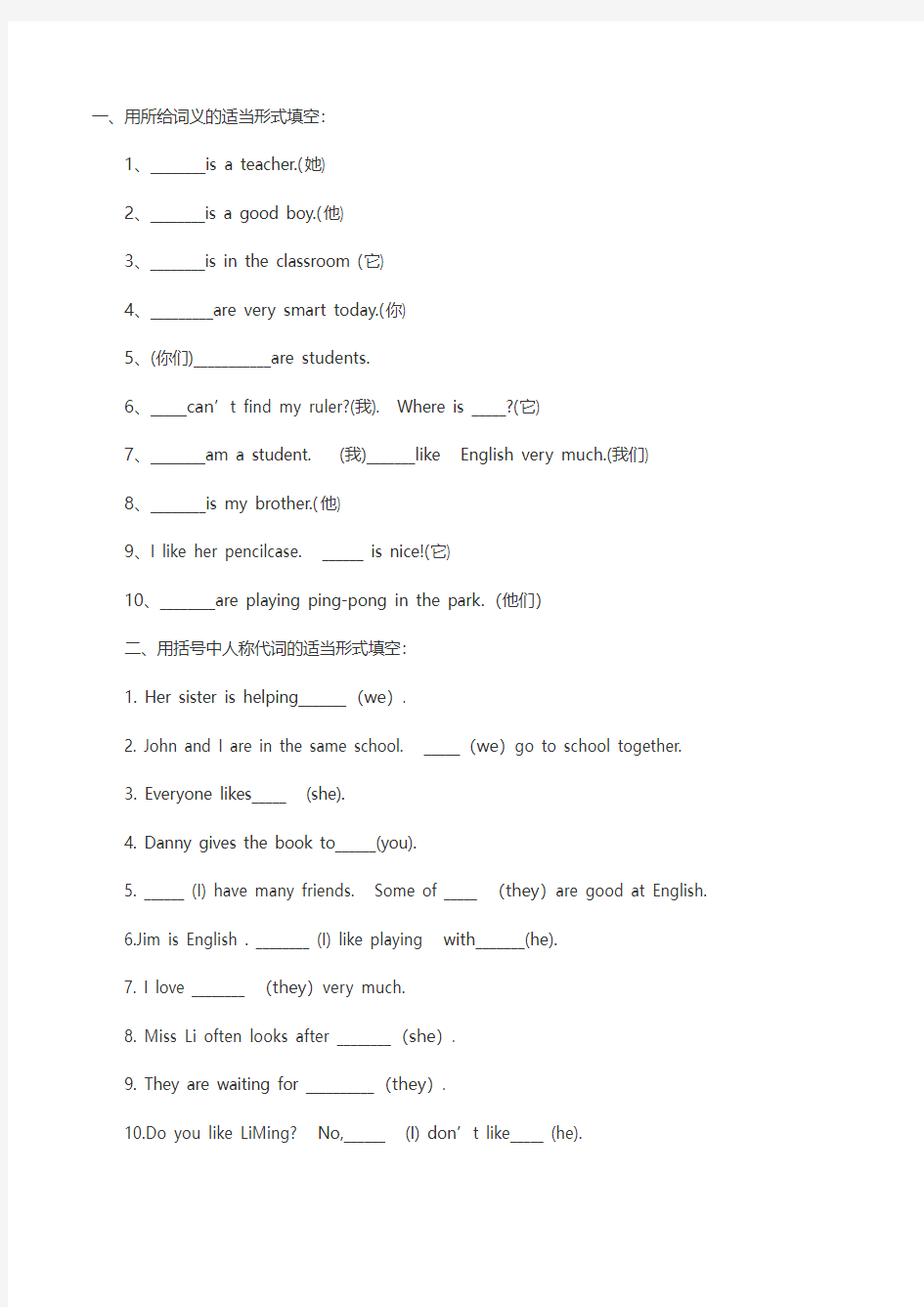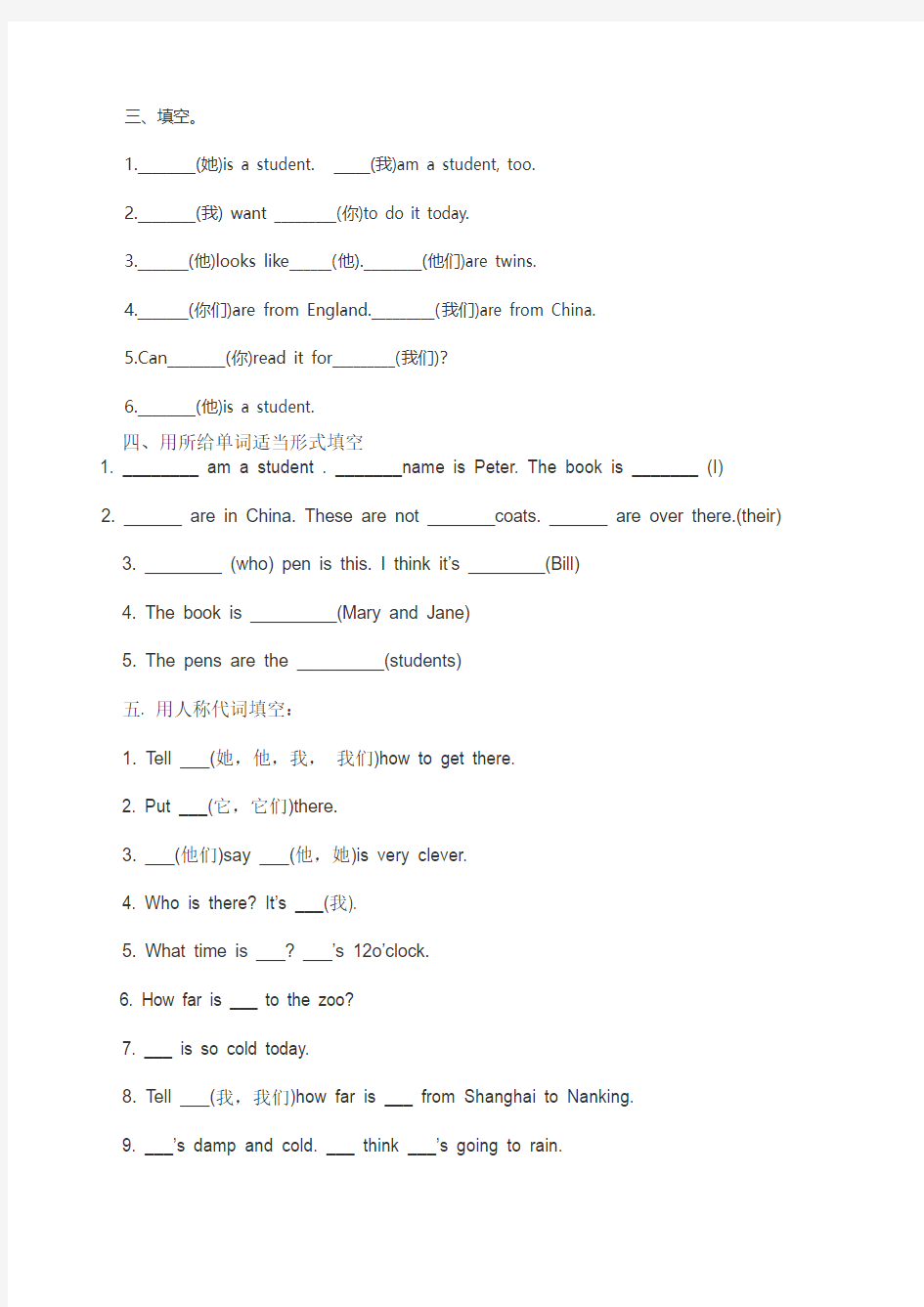

一、用所给词义的适当形式填空:
1、________is a teacher.(她)
2、________is a good boy.(他)
3、________is in the classroom (它)
4、_________are very smart today.(你)
5、(你们)___________are students.
6、_____can’t find my ruler?(我). Where is _____?(它)
7、________am a student. (我)_______like English very much.(我们)
8、________is my brother.(他)
9、I like her pencilcase. ______ is nice!(它)
10、________are playing ping-pong in the park.(他们)
二、用括号中人称代词的适当形式填空:
1. Her sister is helping_______(we).
2. John and I are in the same school. _____(we)go to school together.
3. Everyone likes_____ (she).
4. Danny gives the book to______(you).
5. ______ (I) have many friends. Some of _____ (they)are good at English.
6.Jim is English . ________ (I) like playing with_______(he).
7. I love ________ (they)very much.
8. Miss Li often looks after ________(she).
9. They are waiting for __________(they).
10.Do you like LiMing? No,______ (I) don’t like_____ (he).
三、填空。
1.________(她)is a student. _____(我)am a student, too.
2.________(我) want _________(你)to do it today.
3._______(他)looks like______(他).________(他们)are twins.
4._______(你们)are from England._________(我们)are from China.
5.Can________(你)read it for_________(我们)?
6.________(他)is a student.
四、用所给单词适当形式填空
1. ________ am a student . _______name is Peter. The book is _______ (I)
2. ______ are in China. These are not _______coats. ______ are over there.(their)
3. ________ (who) pen is this. I think it’s ________(Bill)
4. The book is _________(Mary and Jane)
5. The pens are the _________(students)
五. 用人称代词填空:
1. Tell ___(她,他,我,我们)how to get there.
2. Put ___(它,它们)there.
3. ___(他们)say ___(他,她)is very clever.
4. Who is there? It’s ___(我).
5. What time is ___? ___’s 12o’clock.
6. How far is ___ to the zoo?
7. ___ is so cold today.
8. Tell ___(我,我们)how far is ___ from Shanghai to Nanking.
9. ___’s damp and cold. ___ think ___’s going to rain.
英语的名词和人称代词都有三个格,即主格、宾格、属格。
人称代词的三个格如下:
I——me——my
you——you——your
he——him——his
she——her——her
it——it——its
we——us——our
you——you——your
they——them——their
人称代词主格可以用在动词前作主语。
He loves English so much.
She comes from a remote village in the north.
属格用在名词前作定语:
His friends are over there.
His shirt has his initials on it.
宾格用在动词或介系词后面作宾语,也可以用在be动词后面作表语,也可以单独使用。Tell me the way to the post office.
Send the fax to her as soon as possible.
The girl loves her very much.
That poor girl is me.
Who knows how to pronounce the word? Me.
一、用所给单词适当形式填空
1. ________ am a student . _______name is Peter. The book is _______(I)
2. ______ are in China. These are not _______coats. ______ are over there.(their)
3. ________ (who) pen is this. I th ink it’s ________(Bill)
4. The book is _________(Mary and Jane)
5. The pens are the _________(students)
二. 用人称代词填空:
(她)______is very clever.
Who is there? It’s ___ (我的).
___ is so cold today.
(我们) ______ are from Shanghai .
(我)_____think ___ is going to rain.
Show ___(我们) how to do it.
三. 用物主代词填空:
Is this ________(你的)classroom? No, it’s not ___我们的). It’s ___(他们的).
________(他的) brother is an teacher.
_______(谁的)keys are these? _______(他们)是________(我的).
四. 选出括号中正确的词,在正确的词上打勾。
1. This is(my / I)mother.
2. Nice to meet (your / you).
3. (He / His)name is Mark.
4. What’s(she / her)name?
5. Excuse(me / my / I).
6. Are(your / you)Miss Li?
7. (I/ My)am Ben.
8. (She / Her)is my sister.
五、用所给代词的正确形式填空。
1. These are ______ ( he ) brothers.
2. That is _______( she ) sister.
3. Lily is _______ ( Lucy ) sister.
4. Tom, this is _____ ( me ) cousin, Mary.
5. Now _____________(her parent) are in America.
6. Those __ ________ ( child ) are _____ ( I ) father’s students.
7. Do you know ______ ( it ) name?
动词第三人称单数变化规则
1) 一般情况下,动词后面直接加-s. 例如:works gets says reads
2) 以ch,sh,s,x 或o 结尾的动词,在后面加-es。例如:go-goes teach-,teache wash-washes brush-brushes ,catch-catches ,do-does ,fix -fixes
3) 以辅音字母+ y结尾的动词,把y变为i 再加-es. 例如:
study- studies try-tries carry-carries ,fly-flies cry-cries
现在分词变化规则
1.直接+ ing(例:sleep+ing sleeping)
2.去e+ing(例:bite-e+ing biting)
3重读闭音节,且末尾只有1个辅音字母,双写辅音字母+ing(例:sit+t+ing sitting)
4.特殊变化:die-dying,lie-lying,tie-tying
5.不规则变化
现在进行时的基本用法:
A 表示现在( 指说话人说话时) 正在发生的事情。例:We are waiting for you.
B. 习惯进行:表示长期的或重复性的动作,说话时动作未必正在进行。
例:Mr. Green is writing another novel. (说话时并未在写,只处于写作的状态。) 例:She is learning piano under Mr. Smith.
C.已经确定或安排好的将来活动I'm leaving for a trek in Nepal next week.(已经安排了)we're flying to Paris tomorrow.(票已经拿到了)
D.有些动词(状态动词不用于进行时态)
1.表示知道或了解的动词:believe,doubt,forget,imagine,know,
remember,realize,suppose,understand
2.表示―看起来‖―看上去"appear,resemble,seem
3表示喜爱或不喜爱hate,like.lover.prefer
4表示构成或来源的动词be come from.contain,include
5表示感官的动词hear see smell sound taste
6表示拥有的动词belong to.need.own .possess.want wish